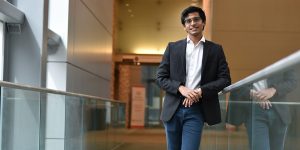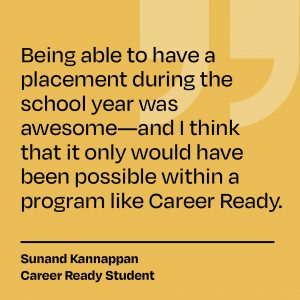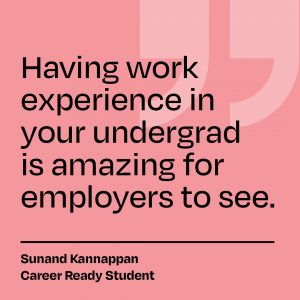Student Spotlight: Sunand Kannappan

It was less than a year ago that Sunand Kannappan decided to sign up for a TECHNATION hackathon—a decision that would help launch his future career. His team came in second place in that initial student challenge, and he went on to win another in 2021. But he would walk away from his hackathon experience with more than just a trophy—it was at one of these events that he learned about our Career Ready Program, which opened the door to an incredible opportunity.

As a health science student at the University of Calgary, Sunand recognized that the Career Ready Program could subsidize his part-time internship at NanoTess, a young health-solutions start-up that he had previously volunteered with. Not only would an internship provide him with valuable industry experience, but he could also bring his own unique skill set to NanoTess. He pitched the program to them, and they went for it.
We caught up with Sunand to ask him about his experience with TECHNATION events and the Career Ready Program, and here’s what he had to say:
Q: How did you hear about TECHNATION and Career Ready?
S: I heard about TECHNATION’s hackathon on social media, and it was a really cool experience. TECHNATION hackathons allow you to get your hands on a real-world issue and apply some interesting analytical techniques. In the first one, we developed a tool for small businesses to survive the pandemic—we tried to find ways for them to source software and technology in a more efficient way. At one of our TECHNATION events for the fall 2020 hackathon, I heard about Career Ready, and it seemed like an exciting opportunity.
Q: How did you end up with a Career Ready internship at NanoTess?
S: I’d learned about NanoTess last summer and had done a little bit of volunteer work with them, and I probably would have continued doing so on the side. But then I realized that Career Ready was an opportunity for me to upscale my relationship with them, while also making myself, as a student, affordable to them. So I had a conversation with them. They’re incredibly clever in terms of leveraging funding to get stuff done, which is why I think Career Ready was attractive—there’s essentially no downside to a program like this.
Q: Can you tell me about your internship experience?
 S: Being able to have a placement during the school year as a part-time opportunity was awesome—and I think that it only would have been possible within a program like Career Ready.
S: Being able to have a placement during the school year as a part-time opportunity was awesome—and I think that it only would have been possible within a program like Career Ready.
NanoTess is focused on developing nanotechnology-based formulations for important medical conditions. Currently, they’re working in the diabetic foot-ulcer space. I have lots of experience in database development and management for clinical trials, so my role was developing the plan for the clinical trial alongside the data systems to support it. It involved determining what sort of data that NanoTess would be receiving on a patient when they came in for a clinical trial, and building the infrastructure to reliably collect it electronically.
Q: How were you able to apply your skills in your internship?
S: I developed a lot of skills through research—like understanding databases and how clinical trials work—but I never really got to apply them in a non-academic context. This was my first real opportunity to work with a start-up that was looking to utilize the exact skills that I already had. It was a significant learning experience to see how a clinical trial works in the non-academic world, and to have a hand in building it out from the beginning to the end. It felt extremely empowering to be an intern and to work on things that were going to be shaping the clinical trial.
Q: What are some of the soft skills that you developed while working with NanoTess?
S: Working with a team and aligning to team objectives. For example, needing to reach a specific deadline because there are other deliverables that other members of the team need to complete. You don’t face those sorts of constraints in research. Also, being able to understand and align with their long-term strategy and vision.
Presenting work in a research context is also different from presenting your work in a start-up. I was a content specialist in a particular area, and the CEO didn’t know the details of the area that I was working on, so I needed to learn to frame the work that I was doing in a way that made sense and was relevant.
Q: How did participating in the Career Ready Program prepare you for your first job out of school?
 S: This internship is one of the experiences that I highlighted in my interview. Having work experience in your undergrad is amazing for employers to see. Apart from that, it has given me a little bit of a broader perspective as to the types of constraints, limitations and strengths of working in industry. Time really is money, and that’s perhaps not always the case in academia. Being able to be part of things like sourcing funds and really seeing an organization grow increased my sensitivity to the nuances of that world.
S: This internship is one of the experiences that I highlighted in my interview. Having work experience in your undergrad is amazing for employers to see. Apart from that, it has given me a little bit of a broader perspective as to the types of constraints, limitations and strengths of working in industry. Time really is money, and that’s perhaps not always the case in academia. Being able to be part of things like sourcing funds and really seeing an organization grow increased my sensitivity to the nuances of that world.
Q: Has the experience shaped your career plans?
S: For sure. I had always been interested in both technology and medicine, and I’d been looking for ways to combine those two spaces. Because of the Career Ready Program, I was able to marry them in the industry¬, which excited me a lot. I’m not currently working on any entrepreneurial projects, but the experience has made me interested in potentially going in that direction in future. I’ll be working full-time in management consulting with a focus on technology over the next couple of years, and I think a big part of that was having this introductory experience with the feeling of working in technology.
Q: What would you like students or employers to know about TECHNATION and Career Ready?
S: On the event side of things, TECHNATION has some great student challenges with amazing partnerships and support—they have some of the most well-funded and supported events in Canada, in my opinion. The types of problems you try to deal with are very real-world, and so are the types of skills that you build. Microsoft Azure is a tool I learned through TECHNATION which I then applied elsewhere within the next two months. On the Career Ready side of things, it’s a way for you to get work experience, and it encourages and supports start-ups that otherwise would not have an opportunity to hire students like me.
How can Career Ready work for you?
Students: Sign up for our newsletter for details on upcoming events and Career Ready work experience opportunities.
Employers: Learn more about the Career Ready Program and how you can hire a student for a summer or fall internship.



 S: Being able to have a placement during the school year as a part-time opportunity was awesome—and I think that it only would have been possible within a program like Career Ready.
S: Being able to have a placement during the school year as a part-time opportunity was awesome—and I think that it only would have been possible within a program like Career Ready. S: This internship is one of the experiences that I highlighted in my interview. Having work experience in your undergrad is amazing for employers to see. Apart from that, it has given me a little bit of a broader perspective as to the types of constraints, limitations and strengths of working in industry. Time really is money, and that’s perhaps not always the case in academia. Being able to be part of things like sourcing funds and really seeing an organization grow increased my sensitivity to the nuances of that world.
S: This internship is one of the experiences that I highlighted in my interview. Having work experience in your undergrad is amazing for employers to see. Apart from that, it has given me a little bit of a broader perspective as to the types of constraints, limitations and strengths of working in industry. Time really is money, and that’s perhaps not always the case in academia. Being able to be part of things like sourcing funds and really seeing an organization grow increased my sensitivity to the nuances of that world.